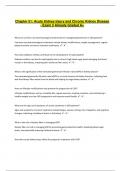Chapter 51: Acute Kidney Injury and Chronic Kidney Disease
- Exam 3 Already Graded A+
What are common non-pharmacological treatments for managing hypertension in CKD patients?
Common non-pharmacological treatments include dietary modifications, weight management, regular
physical activity, and stress reduction techniques. ✔️✔️
How does diabetes mellitus contribute to the development of nephropathy?
Diabetes mellitus can lead to nephropathy due to chronic high blood sugar levels damaging the blood
vessels in the kidneys, impairing their ability to filter waste. ✔️✔️
What is the significance of the estimated glomerular filtration rate (eGFR) in kidney disease?
The estimated glomerular filtration rate (eGFR) is a crucial measure of kidney function, indicating how
well the kidneys filter waste from the blood and helping to stage kidney disease. ✔️✔️
How can lifestyle modifications help prevent the progression of CKD?
Lifestyle modifications such as a healthy diet, regular exercise, smoking cessation, and maintaining a
healthy weight can slow CKD progression and improve overall health. ✔️✔️
What are the signs and symptoms of uremic syndrome in CKD patients?
Signs and symptoms of uremic syndrome include fatigue, nausea, itching, loss of appetite, and cognitive
changes, indicating a buildup of toxins in the blood. ✔️✔️
What is the role of dietary fiber in managing CKD?
Dietary fiber can aid in managing CKD by promoting gastrointestinal health, stabilizing blood sugar
levels, and potentially lowering cholesterol levels. ✔️✔️
How does acute kidney injury affect the prognosis of patients with CKD?
,Acute kidney injury can worsen the prognosis of patients with CKD by accelerating the decline in kidney
function and increasing the risk of progression to end-stage renal disease. ✔️✔️
What is the role of calcium and vitamin D in kidney health?
Calcium and vitamin D play vital roles in bone health and mineral balance, which can be disrupted in
CKD, necessitating supplementation in some patients. ✔️✔️
How does obesity contribute to the risk of developing CKD?
Obesity contributes to CKD risk by increasing the likelihood of diabetes and hypertension, both of which
are significant risk factors for kidney disease. ✔️✔️
What factors can lead to fluid retention in CKD patients?
Fluid retention in CKD patients can result from impaired kidney function, heart failure, high salt intake,
and certain medications. ✔️✔️
What are the benefits of renal replacement therapy for patients with end-stage renal disease?
Renal replacement therapy, including dialysis and kidney transplantation, can help manage symptoms,
remove waste products, and improve quality of life in end-stage renal disease patients. ✔️✔️
How does hyperphosphatemia occur in CKD patients?
Hyperphosphatemia occurs in CKD patients due to the kidneys' decreased ability to excrete phosphorus,
leading to elevated serum phosphate levels. ✔️✔️
What is the significance of regular follow-up appointments for CKD patients?
Regular follow-up appointments are essential for monitoring kidney function, managing complications,
adjusting treatments, and providing education to enhance patient outcomes. ✔️✔️
How does smoking cessation impact kidney health?
Smoking cessation can improve kidney health by reducing the risk of developing CKD, lowering blood
pressure, and improving overall cardiovascular health. ✔️✔️
, What is the impact of electrolyte imbalances in CKD patients?
Electrolyte imbalances in CKD patients can lead to serious complications, including arrhythmias, muscle
weakness, and bone disorders, making monitoring and management crucial. ✔️✔️
How can support groups benefit individuals living with CKD?
Support groups can provide emotional support, share coping strategies, and educate individuals about
managing their condition, improving their quality of life. ✔️✔️
After an arteriovenous graft is inserted in a patient's right forearm, the patient reports pain and
coldness in the right fingers. Which action would the nurse take?
a. Remind the patient to take a daily low-dose aspirin tablet.
b. Report the patient's symptoms to the health care provider.
c. Elevate the patient's arm on pillows above the heart level.
d. Teach the patient about normal arteriovenous graft function. ✔️✔️b. Report the patient's
symptoms to the health care provider.
The patient's problems suggest the development of distal ischemia (steal syndrome) and may require
revision of the arteriovenous graft (AVG). Elevating the arm above the heart will further decrease
perfusion. Pain and coolness are not normal after AVG insertion. Aspirin therapy is not used to maintain
grafts.
Which assessment finding would the nurse expect when a patient with acute kidney injury (AKI) has an
arterial blood pH of 7.30?
a. Persistent skin tenting.
b. Rapid, deep respirations.
c. Hot, flushed face and neck.
d. Bounding peripheral pulses. ✔️✔️b. Rapid, deep respirations.




